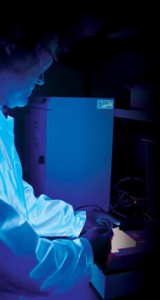Innovation and research are taking Lethbridge College to interesting places of late, realms of fang and fin, of DNA, of computer wizardry and the world’s oldest profession. We’ve got cougars in the Cousins Science Centre, fish in computer labs and all manner of growth in agriculture technology.
of DNA, of computer wizardry and the world’s oldest profession. We’ve got cougars in the Cousins Science Centre, fish in computer labs and all manner of growth in agriculture technology.
Teaching is a phenomenal experience, knowing you’re helping the next generation by producing students who will be of great value to the community. Tom Graham Instructor, Cellular Molecular Technician program
Tom Graham: microbe hunter
By his own description, Tom Graham works “in the realm of the unseen.” He understands if his listeners sometimes glaze over when he explains his passion for microbiology, a world so small that most folks cannot even begin to fathom it.
“My daughter says I put the capital N in nerdy,” says Graham, instructor in Lethbridge College’s Cellular Molecular Technician program, yet again being asked to dumb down an explanation by a visitor to his lab in an almost-hidden alcove on the top floor of the Cousins Science Centre.
But if microbes lack a certain sexy cachet, cougars – the kind that would rather eat poodles than walk them – have far greater staying power in everyday conversation.
Suddenly, Graham is holding people’s attention a little longer with tales of a predatory species that poses, in fact, a far less deadly threat to humans than the scary monsters from “the realm of the unseen.”
“I’m quite fond of diseases and amazed at what little bugs can do to large entities,” says Graham, who looks not so much like a mad scientist, but more like the shortstop on the company softball team, replete with ball cap, blue jeans and great range.
“I have a curiosity; I like to get into things to see what makes animals the way they are.” So, when microbiologist meets Puma concolor, the fur flies. After 15 years with the Public Heath Agency of Canada, located in the Animal Diseases Research Institute, Graham left the coulees of deep West Lethbridge for the chance to teach at Lethbridge College in 2004. His arrival was, for a scientist, serendipitous: three years later, the college opened research quality laboratories in its upgrade of the Cousins Science Centre, a Hyde-to-Jekyll transformation that still has instructors swooning.
“The Cousins is a Level 2 Biosafety containment facility,” says Graham. “It’s allowing us to do good work and to introduce students to cutting-edge research and equipment. It was done right: the city is becoming known as a research centre because of these facilities and those at the University of Lethbridge, The Lethbridge Research Centre and the Animal Diseases Research Industry.”
Graham predicts greater collaboration among these four will make Lethbridge renowned as a centre of research in Western Canada, and that will have positive implications for this community and all students.
“As we develop tighter bonds with other researchers, it will help all parties and the students will benefit from that bonding. It will tie them into the people who will be hiring them one day.” Graham agrees his cellular-molecular Technician program is a rough tumble for students because it exposes them to a lot of material in a short time. The good news, though, for those who can keep on track is transferability. Those who then seek higher education can often find student jobs related to their studies, rather than unrelated ones. The results: greater links to potential employment.
Graham’s teaching philosophy is centred on providing students with experiences beyond books. The cougar DNA study is one such opportunity, but it’s far from the lone example. Graham involved students in a water-quality study on the Blood Reserve a couple of years ago, and Lethbridge College’s forays into South Africa, which he now leads, have regularly included students in the delivery of a school-based water and sanitation project.
The South Africa program was started by the soon to be-retired Jerry Johnson, a Lethbridge College instructor who involved several groups of students to help facilitate improved sanitation.
“Jerry has a world-renowned reputation in international work. I’d like to carry it on. I think you have a stronger project if you include students because they will help others down the road. And, it’s a real learning experience for everyone; you get to know real people who are struggling to exist day to day.”


